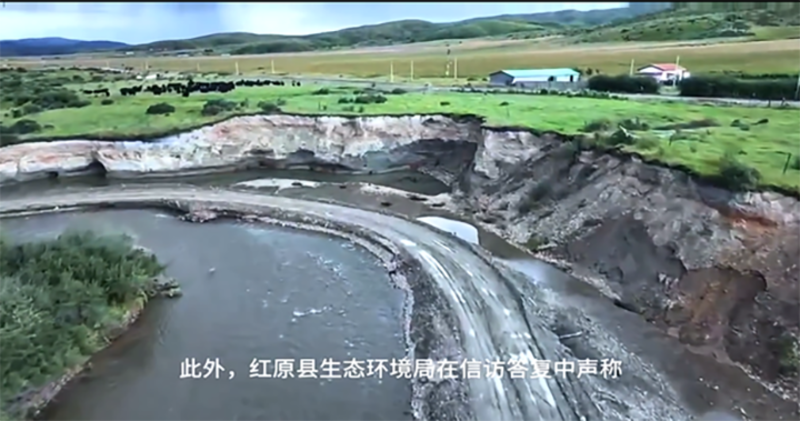Chinese authorities have detained a Tibetan environmental activist from Sichuan province after he made a rare public appeal on social media for action against a company he accused of illegally extracting sand and gravel from a river, two Tibetan sources said.
On Oct. 15, Tsogon Tsering from Tsaruma village in Kyungchu county posted a five-minute video on WeChat in which he accused Anhui Xianhe Construction Engineering Co. of causing extensive environmental damage to the Kyungchu River, including severe soil erosion and reduced water levels.
Two days after his public appeal — a rare action in Tibet, where speaking out against authorities or state-approved projects often leads to reprisals — officials summoned Tsering, 29, and other villagers for questioning.
They were all initially released back to their homes, but Tsering was summoned again and detained “a day or two after” Oct. 20, said the sources, who live in Tibet and in exile, respectively.
Tsering has remained in custody since then, added the sources, who declined to be named out of fear of reprisals by Chinese authorities.
“His family and fellow villagers are concerned about him and are hoping for his release, as they say he has committed no crime,” said the Tibetan inside the region.

Tsering’s detention is an example of the risks Tibetans face for speaking out and the swift action authorities take to silence those who raise concerns about environmental degradation in their communities, especially when linked to Chinese companies.
International Campaign for Tibet, a rights group based in Washington, raised concerns about the well-being of the whistleblower, noting that other Tibetan environmental defenders have faced persecution for their activism.
Environmental activist Anya Sengdra is one of them. In 2019, Chinese authorities sentenced him to a seven-year prison term on charges of disturbing social order after he complained online about corrupt officials, illegal mining and the hunting of protected wildlife.
Quick action
Authorities acted quickly after Tsering’s video became popular on Chinese social media, shutting down his WeChat account and censoring all search terms related to his name on the platform.
The video, which gained significant attention online, had been widely shared by other users on the platform, but even those were taken down, and all related content had been censored by Oct. 17, Radio Free Asia learned.
“The video statement, which went viral on Chinese social media, reveals a troubling situation of environmental neglect, corporate irresponsibility, and apparent governmental inaction in protecting a critical water source for Asia,” said the International Campaign for Tibet.
“The young Tibetan man is at risk of persecution for expressing his frustration at the environmental damage in his hometown and seeking redress publicly,” the advocacy group said in a statement.
In the video, Tsering says Tibetan residents had repeatedly appealed to local authorities to take action against the company for causing environmental harm, but to no avail.
He adds that the county’s Ecological Environment Bureau responded to his complaint in April, confirming that the construction company had extracted sand and stones from the Kyungchu River, which feeds into China’s Yangtze and Yellow rivers, and that the company had been fined.
But Tsering said the response merely sought to cover up for the enterprise, with no action taken.
“The pollution of these river sources and the protection of local ecosystems and biodiversity are deeply interconnected issues,” he said.
“Moreover, this directly affects the water resources of Asia and the conditions of the high-altitude frozen soil.”
Anhui Xianhe Construction Engineering, registered in China in June 2012, is involved in various construction projects, including road construction, urban development, hydropower projects and environmental protection works.
Additional reporting by Dickey Kundol. Translated by Tenzin Dickyi for RFA Tibetan. Edited by Tenzin Pema for RFA Tibetan, and by Roseanne Gerin and Joshua Lipes.
